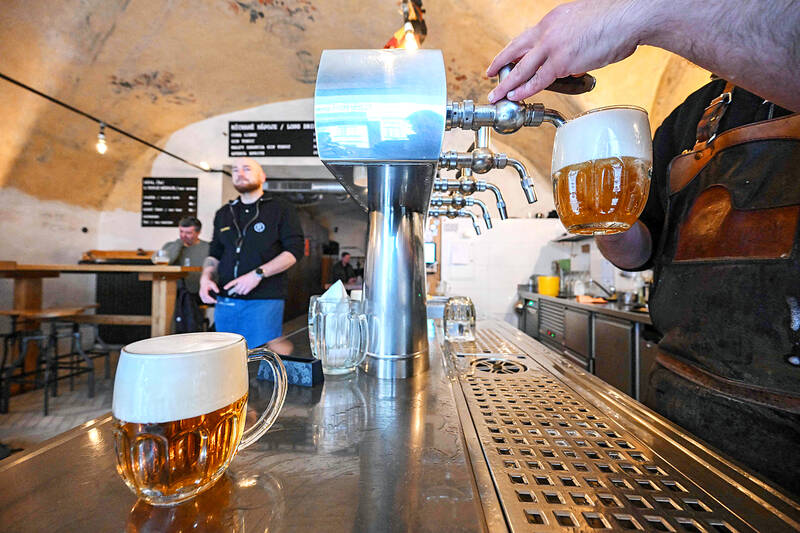Going to a pub several times a week to meet friends, media consultant Gabriela Galetkova hopes Czech beer culture — which is taking a hit as bar visits dip — will be internationally recognized.
“I won’t buy beer to drink at home. For me, Czech beer culture is about meeting people in a typical Czech pub,” the 54-year-old said in a Prague bar serving the trademark Pilsner lager with thick froth.
While many beer drinkers in the central European nation are turning away from pubs, often to save money, Czech beer professionals are seeking a listing by UNESCO among the world’s cultural heritage as a possible boost.

Photo: AFP
Czech beer culture deserves a place on the UN agency’s intangible heritage lists owing to its “global reputation,” Czech Beer and Malt Association head Tomas Slunecko said.
“Wherever you go in Europe or the world, people ask you about Czech beer,” the former diplomat added.
If Czech beer culture gets listed by UNESCO, it would be the second after Belgium, listed in 2016 — which Slunecko said “really boosted the reputation of local beer-making, not only inside Belgium, but also abroad.”
The Czech Ministry of Culture already put it on the national list in January — a necessary condition for international recognition — while Slunecko and others are embarking on promoting their bid.
The Czech beer-making tradition is more than 1,000 years old and beer is omnipresent in Czech history and culture, while local lagers have made Czech beer-makers famous and inspired brewers worldwide.
The nation has more than 550 breweries, including 500 small ones that have emerged during a boom over the past two decades.
Czech breweries employ 65,000 people, make about 20 million hectoliters of beer a year and export roughly one-quarter, mainly to other EU nations such as Germany, Poland, Slovakia and Hungary.
However, while the tradition is rich and colorful, and the reputation solid, Czech drinkers are shirking their pub duty.
Beer consumption in the nation of 10.9 million retained a world-leading level of 128 liters per person in 2023, but is down from 143 liters a decade ago, Slunecko said.
Beer prices have doubled over the past decade on tax hikes and higher input costs, and the popular tipple is no longer cheaper than water in Prague pubs, where a pint of Pilsner Urquell costs about 70 koruna (US$3).
This has gradually led drinkers to turn to supermarkets for cheaper bottled beer, industry data shows.
The COVID-19 pandemic made things worse as it shuttered pubs and closed borders for months, sending more drinkers to their living rooms and reducing the number of foreign tourists who drink a hefty portion of the beer sold in Czech pubs.
The Czech Chamber of Commerce said that 15 percent of local venues closed and another 15 percent changed hands due to the pandemic.
Many small towns and villages now lack a place to go for a pint.
“The share of beer consumed in pubs and at home used to be 50-50. At present pubs only make up 30 percent,” Slunecko said.
Many Czechs also opt for a healthier lifestyle or prefer to meet their friends online, he said.
“The decline is a trend that we can see elsewhere in Europe,” Slunecko added.
Meeting people is the main reason why Czechs go to pubs, said sociologist Jiri Vinopal, citing his continuous research since 2004.
“Czech beer culture is something that helps people connect and keeps society together, create an identity, whether locally or at the national level,” he said.
Slunecko said female drinkers could help end the downtrend as an increasing number now go to pubs, attracted by their growing standard, variety of drinks on offer and quality food.
“It’s about quality replacing quantity. I think the cultured environment and the broad offer is a way to win drinkers back,” Slunecko said, likening pubs to “a social network.”
“A pub is a pleasant place to meet and there’s nothing wrong about drinking beer,” he said.

‘EYE FOR AN EYE’: Two of the men were shot by a male relative of the victims, whose families turned down the opportunity to offer them amnesty, the Supreme Court said Four men were yesterday publicly executed in Afghanistan, the Supreme Court said, the highest number of executions to be carried out in one day since the Taliban’s return to power. The executions in three separate provinces brought to 10 the number of men publicly put to death since 2021, according to an Agence France-Presse tally. Public executions were common during the Taliban’s first rule from 1996 to 2001, with most of them carried out publicly in sports stadiums. Two men were shot around six or seven times by a male relative of the victims in front of spectators in Qala-i-Naw, the center

Australia’s opposition party yesterday withdrew election promises to prevent public servants from working from home and to slash more than one in five federal public-sector jobs. Opposition leader Peter Dutton announced his conservative Liberal Party had dropped its pledge that public servants would be required to work in their offices five days a week except in exceptional circumstances. “I think we made a mistake in relation to this policy,” Dutton told Nine Network television. “I think it’s important that we say that and recognize it, and our intention was to make sure that where taxpayers are working hard and their money is

Canadian Prime Minister Mark Carney is leaning into his banking background as his country fights a trade war with the US, but his financial ties have also made him a target for conspiracy theories. Incorporating tropes familiar to followers of the far-right QAnon movement, conspiratorial social media posts about the Liberal leader have surged ahead of the country’s April 28 election. Posts range from false claims he recited a “satanic chant” at a campaign event to artificial intelligence (AI)-generated images of him in a pool with convicted sex offender Jeffrey Epstein. “He’s the ideal person to be targeted here, for sure, due to

DISPUTE: Beijing seeks global support against Trump’s tariffs, but many governments remain hesitant to align, including India, ASEAN countries and Australia China is reaching out to other nations as the US layers on more tariffs, in what appears to be an attempt by Beijing to form a united front to compel Washington to retreat. Days into the effort, it is meeting only partial success from countries unwilling to ally with the main target of US President Donald Trump’s trade war. Facing the cratering of global markets, Trump on Wednesday backed off his tariffs on most nations for 90 days, saying countries were lining up to negotiate more favorable conditions. China has refused to seek talks, saying the US was insincere and that it